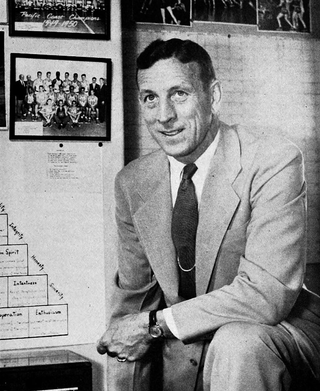Coaching
Life Lessons of the Greatest Coach
John Wooden knew how to bring out the best in human beings
Posted May 16, 2019
Coaching has come to be regarded as a prime approach to enabling persons and teams to perform at their best. The term "coach" was introduced in 19th century Britain as slang for a teacher who would convey a learner through a course of study, and today we apply it to leaders in sports, business, and professions such as medicine. To understand what coaching at its best looks like, we can turn to no finer example than John Wooden, perhaps the greatest coach in the history of American sports.
Wooden was born in the small town of Hall, Indiana in 1901. A highly successful high school basketball player, he went on the become the first three-time consensus All-American at Purdue University. He then played professional basketball, once making 134 consecutive free throws. Eventually inducted into the Basketball Hall of Fame as a player in 1961, at the conclusion of his playing career he put his college degree to work teaching English and coaching athletic teams in high schools.
Wooden became head coach at Indiana State University in 1946 before accepting the position of head coach at UCLA in 1948. Wooden turned a faltering UCLA program into a winner, garnering a record 10 national championships, including a streak of 88 consecutive winning games. In 1973, he was inducted into the Hall of Fame as a coach, becoming the first person to be so honored as both player and coach. Wooden retired from coaching after his 1975 championship season. He died in 2010 at age 99.

Wooden loved to tell the story that when he graduated from the 8th grade, his father presented him with a seven-point creed that Wooden strove to live by the rest of his life. The creed may have originated in a 1931 article in American Magazine, which was based on an interview with John Clarke, a retired associate justice of the US Supreme Court. To the six principles Clarke outlined, Wooden added a seventh about the importance of counting your blessings. Here are Wooden’s seven points:
1. Be true to yourself. Wooden believed that in order to perform at our best, we must first know what we are capable of, which means knowing ourselves. He stressed that we should evaluate our effort not by whether we win or lose but by whether we have performed as close as possible to our full potential.
2. Make each day your masterpiece. Wooden’s attention to fundamentals was legendary and extended to teaching players how to tie their shoes. His point? Each part of a whole must be its best if the whole is to shine, a principle he regarded as equally applicable to each of the days in a whole life. As scriptwriters for our own lives, we need to produce the best copy we can.
3. Help others. Wooden was once asked how many championships he thought Kobe Bryant would win. His response was “None.” His point? No player wins championships, only teams do. Wooden relentlessly stressed the importance of sacrificing for the team, holding that “a player who makes a team great is more valuable than a great player.”
4. Drink deeply from good books. As an English teacher, Wooden believed in the power of the written word, arguing that the books we read furnish many of the most important ideas with which we lead our lives. If our ideas are poor, our lives are likely to be poor as well. It will not come as a surprise to most to learn that Wooden’s favorite book was the Bible.
5. Make friendship a fine art. When Wooden was interviewed by a reporter near the end of his long life, he was able to provide current information on nearly all the players from his championship teams of decades before. For Wooden, coaching was not for college years alone, and he prized relationships with his players more and more over the course of his life.
6. Build a shelter against a rainy day. Wooden believed that money, power, and success are less important than family and faith. People who visited his home in later years were often surprised to find relatively few items of sports memorabilia. What they found instead were books that could teach a person how to bounce back from setbacks and lead a good life.
7. Pray for guidance and give thanks for your blessings every day. When UCLA’s 88-game winning streak came to an end, Wooden expressed relief. He had found that the streak was distracting his players from excellence on the court. Once it was over, they could stop worrying about extending the streak and refocus on playing their best basketball.
Perhaps Wooden’s proudest moment came in 1947. Having won its conference championship, his Indiana State team was invited to the national tournament. When Wooden learned that a rule prohibited teams from fielding a black player, he declined the berth. One of Wooden’s player’s, Clarence Walker, was black. The next year, the rules were changed, and Walker became the first black player to appear in any post-season tournament.
Wooden always said, “Learn as if you were to live forever, but live as if you were to die tomorrow.” He was a master coach who expressed lofty ideals and lived up to them in his professional and personal life. He practiced what he preached, speaking loudest of all through example. He believed that we should be more concerned with who we really are than any reputation we enjoy, and that there is no more vital and enduring resource we can tend to than character – our own and those of others.




